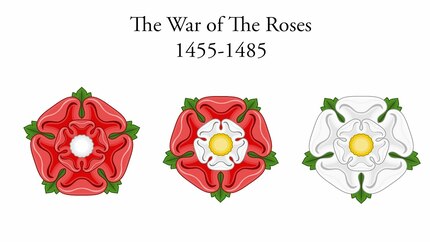...THE BATTLE OF BOSWORTH DIDN’T END THE WARS OF THE ROSES. THEY NEVER EVEN HAPPENED.Every Briton who has studied the Tudors would be able to tell you that the first Tudor King, Henry VII, became King because he killed Richard III at the Battle of Bosworth. Thus far they would be correct, but if they were to say this ended the Wars of the Roses they would be wrong on a number of counts. Firstly, and perhaps most simply, the Battle of Bosworth was not the last battle in the struggle between York and Lancaster. Even after Henry had married Elizabeth of York in 1486, thereby supposedly uniting the two Houses, he had to fight to hold his throne. In 1487, with Henry having been on the throne for two years, a sizable Yorkist army of 8,000 was mustered, sailed from Ireland to Lancaster and thence marched into the Midlands. This army was gathered in support of the claim of Lambert Simnel (or Edward of Warwick if we believe the “pretender’s” claims). Simnel’s forces were comprehensively beaten at the Battle of Stoke, but clearly Bosworth was not the conclusive end to the conflict between the two Houses which is in our popular imagination. Moreover, even the Battle of Stoke cannot be considered the end of the struggle. This is not just because there were further pretenders to the throne, such as Perkin Warbeck, championing the Yorkist cause, but rather because the Wars of the Roses never happened. In Henry VI Part 1, he has nobles pluck a flower as a badge of their allegiance: PLANTAGENET Let him that is a true-born gentleman And stands upon the honour of his birth, If he suppose that I have pleaded truth, From off this brier pluck a white rose with me. SOMERSET Let him that is no coward nor no flatterer, But dare maintain the party of the truth, Pluck a red rose from off this thorn with me. WARWICK I love no colours, and without all colour Of base insinuating flattery I pluck this white rose with Plantagenet. SUFFOLK I pluck this red rose with young Somerset And say withal I think he held the right. However, the white and red roses were not universal symbols of Lancaster and York in the mid fifteenth century. Instead, the white rose was only one of many symbols associated with York; with the yellow sun being more common and Richard I fighting under a white boar. For Lancaster there is even less evidence of the red rose being a defining symbol. Instead, the Lancastrians tended to fight under royal coats of arms, with only the household servants using the red rose for demarcation. Henry VII seemingly adopted the red rose out of symbolic convenience when he married Elizabeth of York. Thus allowing him to create a visual symbol of the union of the Houses in the Tudor Rose. By using the term the Wars of the Roses, we then are unwittingly utilising and propagating Henry VII’s propaganda. He would be very happy to hear us use it, even if those who lived through the Wars themselves would be rather perplexed.
0 Comments
Leave a Reply. |
Categories
All
Archives
April 2024
|




 RSS Feed
RSS Feed